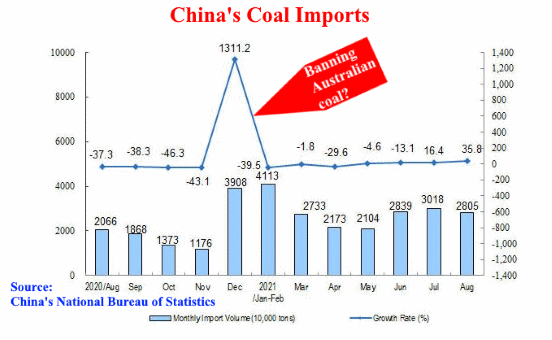The price of crude oil fell again on Friday, having
crossed the psychologically significant $80 a barrel for Brent on Wednesday,
wiping off the gains of the last two days.
As of 09:30 GMT, the prices were at $74.26 and $77.60
respectively.
The sentiments that triggered off the fall may have
stemmed from the combination of three crucial factors: the explicit US
intervention, asking the OPEC+ to produce more oil soon as the prices at this
level are damaging to the global economy; rising US crude inventories, despite
the forecasts to the contrary; China’s power shortages, coupled with slowing
economy and growing political rivalries with its regional neighbours – and beyond.
The unusual announcement by Jake Sullivan, the US National
Security Advisor that he would take up the issue of rising oil price with Saudi
Arabia, the de factor leader of the OPEC, despite that not being in the
administrative domain of the top official, immediately affected the crude oil
markets. On Thursday, Jen Psaki, the White House Press Secretary, expressed the
same sentiment.
Analysts believe that the OPEC+ will not be able to
resist the move this time, especially when the next meeting of the cartel is
just a couple of days away.
On one hand, the relation between Saudi Arabia and
the US is at an all-time-low at present and it is highly unlikely that the
Kingdom would take any measure to widen the gap even further at the expense of
its own security.
On the other hand, the US will release some of its
vast Strategic Petroleum Reserves, if it does not see any progress on this
front and its pleas fall on deaf ears of the major producers in the Middle
East.
The US crude oil inventories, meanwhile, rose
sharply eclipsing the predictions of rising demand: the API, American Petroleum
Institute, said this week there was a build of 4.127 million barrels in the US
crude inventories, when the forecast was a loss of 2.33 million barrels.
The multiple concerns about the state of Chinese
economy, meanwhile, tower above the other factors by a wide margin as far as
the crude oil markets are concerned.
At present, crude oil markets are baffled by the
conflicting signals that come from China: on one hand, China, in line with the
developed world, is pledging to cut down on its use of coal for energy
generation; on the other hand, faced with power shortages in certain regions,
it appears to be gearing up to import oil, gas and of course, coal at ‘all cost’.
If the worrying developments in China, the world’s
second largest economy, are not addressed in time, it will spread like wild
fire in the South East Asia much faster than policy makers anticipate; the markets
in the region are already jittery over inevitable supply-chain issues.
Unfortunately, if remedial collective measures are
not taken in time, it will not just be limited to the region in question. It will
spill over to the rest of the world in no time.
The shortage of computer chips and its impact on global
manufacturing, especially in the car productions, is a classic case in point.
It is true that China is coming down hard on certain
sectors in order to curb what it sees as the wanton excesses of the capitalism
- under the slogan of ‘common prosperity’.
President Xi, who hails from rural China – and then gradually
rose to the top position – must have seen the damage to the society on his
watch in general, in the absence of certain ‘brakes’; time and again, he
highlighted the corruption of certain officials and some sections of China’s
vast economy.
In short, President Xi must have felt that the
exponential growth of the Chinese economy at the expense of its rural
communities is neither sustainable nor socially cohesive that could, in the
end, result in an alarming internal migration in search of prosperity.
The numbers speak for themselves: in 2010, China’s
rural and urban population stood at 671 million and 669 million respectively. In
2020, according to the latest census, the same figures stood at 509 million and
901 million respectively – nearly doubled - showing the gravity of the
challenge faced by China.
The migration that had been increasing over a decade
must have given the impetus for over-zealous developers to embark upon gigantic
projects to make apartments, disparagingly termed as ‘concrete jungles’, a
significant number of which just lie vacant that in turn has now become the
focus of the international financiers.
The financial woes of the troubled Evergrande, in
this context, may be just the tip of a very large iceberg.
Analysts hope China will take the interests of its
neighbours and the West much more seriously in order to tackle the serious
internal issues, some of which are inextricable linked to the various external
players; the coal issue involving Australia is a case in point.
Recently, President Xi made a call to President
Biden and by coincidence the Chief Financial Officer of the mobile giant,
Huawei, saw her freedom along with that of two Canadian citizens.
The quiet diplomacy that worked in this case, if
extended, has the potential to make
similar changes in many other areas of global significance, if leaders look beyond
their immediate political realms.







